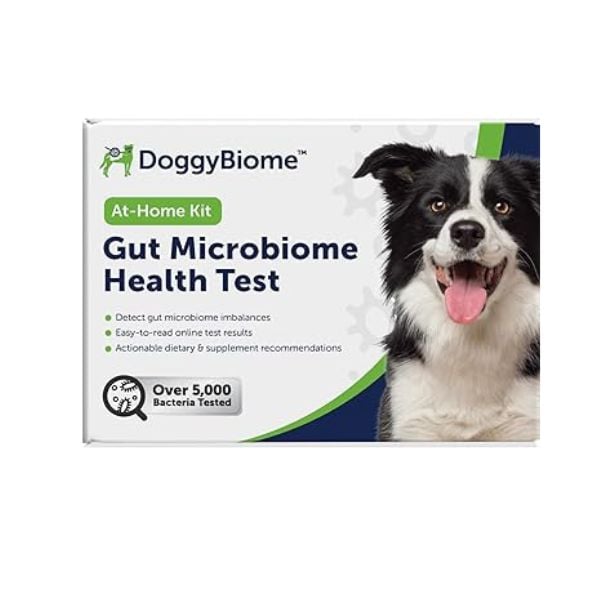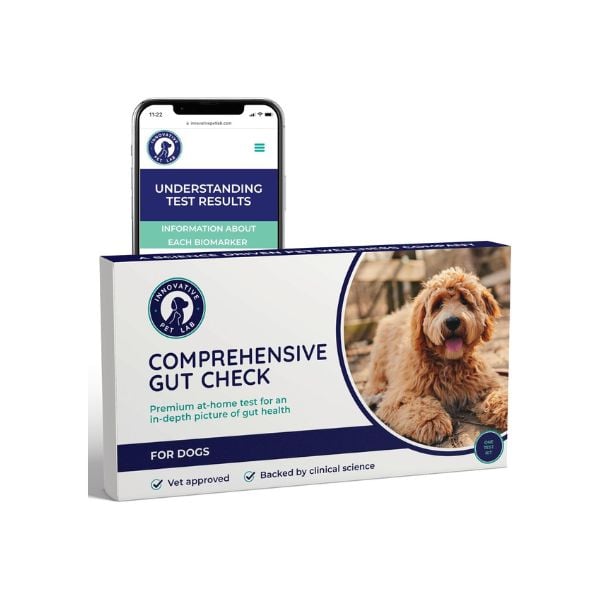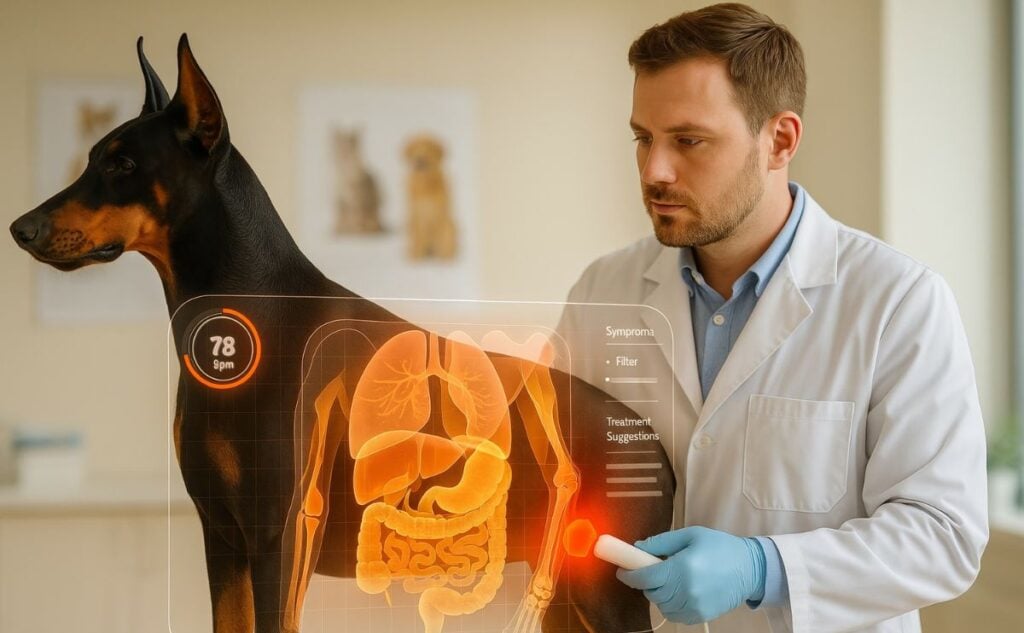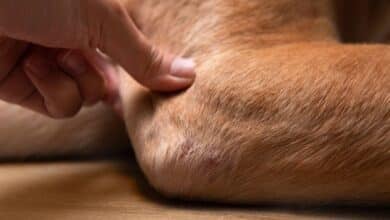What You Need To Know About Dog Gut Health
When you purchase through links on our site, we may earn a commission. Here’s how it works.
In humans, good gut health is widely acknowledged as important, and there are plenty of products on the market to help combat unwanted gastrointestinal symptoms and restore the balance of the good bacteria in your gut. But are dogs just the same? Is good gut health essential for dogs, too? Let’s find out about the importance of a healthy gut in dogs and how you can help support it in your furry friend. You can even start out with an at-home gut microbiome test to get a picture of your pup’s gut health.
Table of Contents
| Best Gut Microbiome Test | Most Comprehensive Gut Test |
|---|---|
 |  |
| AnimalBiome | Innovative Pet Lab |
| Visit Website | View on Amazon |
| Read Review | Read Review |
Why Is Gut Health For Dogs Important?
Digestive health for dogs is just as important as for people. After all, without good digestive function, dogs can’t get the nutrients they need from their food and may develop some unpleasant or worrying symptoms. It’s not just the risk of malnutrition that is a worry when it comes to dog gut health, though.
Just like yours, your dog’s intestinal walls form a physical barrier, keeping unwanted germs out. They also have lots of immune cells at the interface, ready to attack any pathogens that try to break through the intestinal wall into the tissue or bloodstream. So, it’s easy to see why keeping your dog’s (and your) gut health as good as possible will be beneficial for preventing illness and ensuring good nutrition.

What Is Good Gut Health?
Good gut health in dogs requires a good balance of gut microflora (known as the gut microbiome) – a collection of bacteria that are vital for both digestion and immunity. Good gut health also relies on the absorption of nutrients, which requires adequate digestive enzyme production and a large surface area of healthy cells lining the villi of the gut wall. If the microbiome is insufficient or unbalanced, or if the intestinal walls are too thick for absorption to take place, a dog’s gut health will be poor.
What Are The Signs Of Poor Gut Health In Dogs? 7 Symptoms
There isn’t one single symptom associated with poor gut health in dogs. If your dog is affected, you might see several symptoms, and the severity could range from very subtle changes to obvious and concerning. Here are some signs to look out for:
1. Diarrhea
If the digestive function of your dog’s gut isn’t as good as it should be, they might experience diarrhea due to an inability to absorb food that is only partially digested. If the gut lining is inflamed, thickened, or diseased, absorption will be hindered, and loose stools will be the result.
2. Vomiting
Although vomiting suggests a problem with the stomach rather than the intestines, this is not always the case. If gut movement or digestion is slow, the backlog may lead to stomach irritation, nausea, or vomiting. Similarly, certain conditions that affect the gut will also affect the stomach, including injuries from sharp or abrasive foreign material or caustic substances that have been ingested.
3. Weight Loss
Poor gut health means a lack of digestion or absorption of nutrients from food. So, it’s not surprising that some dogs with poor gut health lose weight, even if they have a great appetite. If your dog’s weight has always been on the low side, or if they have experienced a gradual decline in gut health, you might not notice active weight loss but more a low body condition score and a failure to gain weight even though they are eating.
4. Change In Feces Color
In addition to a change in fecal texture caused by diarrhea, poor gut health may also lead to a change in fecal color. The stools may become paler or yellow, or if there is inflammation or ulceration, you may notice fresh red blood or black digested blood. For this reason, it’s a good idea to familiarize yourself with the appearance, color, size, texture, and frequency of your dog’s feces so that you can spot anything outside of the norm quickly.
5. Flatulence
If your dog has gas, it’s often pretty unpleasant. You might find that your dog passing wind clears the room in a flash when you’re entertaining guests! However, frequent and smelly flatulence or regular or severe bloating, especially if it’s unusual for your dog, is not something to be ignored. It could be a sign of a gut upset, poor gut health, or something more serious like bloat or a twisted stomach.
6. Reduced Appetite
As humans, we don’t usually feel like eating when we have gastrointestinal symptoms, and it can be the same for dogs. If your dog is feeling nauseous or bloated, they may not feel like eating much. However, when it comes to appetite and poor gut health, the opposite can also be true.
7. Ravenous Appetite
It might seem counterintuitive, but if your dog has poor gut health, they might actually have a ravenous appetite. You might even find they scavenge for food and eat things they shouldn’t, all as a way to try to get the nutrients that their body is lacking.
My Clinical Experience
I once treated a Labrador with chronic diarrhea and low body weight, which turned out to be due to an allergy to chicken. The dog was losing weight because his intestine was too inflamed to absorb the nutrients from the food he was eating. He was ravenously hungry and was constantly licking the floor, rooting in the dirt, and chewing on wood in the garden.
Thankfully, once the chicken was eliminated from his diet, his diarrhea resolved, and his weight started to creep up within a month. His owners were so pleased when he stopped trying to eat things around the house!
How Can I Check My Dog’s Gut Health?
If you suspect your pup’s gut health is off-balance or just want to make sure it’s healthy, you can do an at-home gut microbiome test. By sending in a small stool sample to the company’s laboratory, scientists can help detect gut imbalances and identify problematic bacteria. An at-home gut microbiome test isn’t meant to replace getting a diagnosis and treatment from your veterinarian, but you can share the test results with your vet to help you and your vet develop a treatment plan.
AnimalBiome Gut Health Test For Dogs Review
Visit Website | View on Amazon
AnimalBiome has an excellent reputation in the field of companion animal health research, and its DoggyBiome Gut Microbiome Health Test comes highly recommended. This test uses comprehensive DNA sequencing technology and innovative scientific research to detect over 5,000 types of bacteria from your dog’s stool.
Results tell you which kinds of bacteria are present in your pet’s gut and the proportions of each type. It not only identifies gut imbalances, but it can also detect pathogenic microbes present in your dog’s gut (e.g., E-coli, Salmonella, Listeria, etc.). Results also provide customized recommendations to make informed choices for your dog’s health and a 15-minute phone consultation with their experts. This test is also available on Embark, a leading dog DNA testing service.
Price
In-Depth AnimalBiome Review
Head over to our full review of AnimalBiome’s DoggyBiome test to discover more about this industry-leading test kit.
Innovative Pet Lab Comprehensive Gut Check For Dogs Review
Although expensive, this at-home test goes beyond identifying what’s in your dog’s gut microbiome. Ideal for pets with chronic GI issues or multiple symptoms, it also addresses digestion, inflammation, and the health of your pup’s gut lining (leaky gut). It gets extremely positive reviews from users who said this test helped them identify allergens that were causing health problems.
Price
How To Improve Dog Gut Health
Your dog’s gut health is dependent on a balanced population of good bacteria (the microbiome) and a healthy intestinal wall that absorbs nutrients and forms a barrier against bacteria. If your dog’s gut health is poor, it’s important to speak to your veterinarian if you are concerned. There are several ways to improve your dog’s digestive health. Just be sure to get your vet’s opinion before changing your pup’s diet or adding supplements.
Are There Any Gut Health Supplements For Dogs?
If you feed your dog a nutritionally complete and balanced diet, its gut should naturally maintain good health, and its microbiome should also be balanced. However, if medication, for instance, disrupts the balance of the microbiome, the good bacteria will need to be replaced, and their growth encouraged.

Probiotics and plenty of dietary fiber-containing prebiotics should help to get the gut flora back in good shape. Digestive or gut health supplements are available in various forms, including sachets and tablets, and can help to restore gut health in dogs that have symptoms. However, it’s important to consult your veterinarian first if your dog has any concerning symptoms so that they can check for anything more serious and prescribe other treatments if required.
If your pup has been diagnosed with allergies, you can discuss supplementation to ease allergy symptoms as well. Check out our reviews of the best dog allergy supplements to learn more.
What Is The Best Dog Food For Gut Health?
While nutritionally complete and balanced dog food is really important, a fresh or lightly-cooked, less processed diet is likely to contain more live bacteria to contribute to the microbiome. It’s also important to consider your individual dog, their preferences, and any dietary sensitivities that they have. For instance, if your dog develops an upset stomach after certain foods or has known food allergies, it’s best to feed them a diet free from allergens.
See our reviews of the best dog food for allergies for some options to try. We also review limited-ingredient dog food and give you our recommendations for sensitive stomach dog chow.
Which Are The Best Dog Gut Health Chews?
Dog gut health chews usually contain probiotics, which are beneficial for most dogs, but what is the best probiotic for dogs’ gut health? It’s important to remember that these chews are only useful if the bacteria they provide survive their trip from the mouth to the gut!
Highly processed gut health chews may not contain any living bacteria to act as a probiotic, while others will contain great living bacteria, but they won’t be protected from the acid in the stomach. If you’re not sure whether the gut health chew you had in mind is a good choice, speak to the team at your veterinary clinic.
What Is Leaky Gut In Dogs?
Leaky gut syndrome in dogs is one of the signs of very poor gut health and an example of why gut health is so important. In leaky gut syndrome, intestinal inflammation affects the wall of the gut, making it less effective as a barrier, meaning that bacteria and foreign material from inside the intestines can enter the body tissues and bloodstream.
Not only does this pose an infection risk, but it may also perpetuate other inflammatory conditions around the dog’s body. Similarly, protein from the body may be lost through the disrupted gut barrier, causing weight loss, which is known as protein-losing enteropathy.
Leaky gut syndrome is a symptom caused by damage to the gut, which could occur due to trauma, allergies, medication, certain toxins, infections, parasites, or a chronic imbalance of the microflora in the gut. Knowing the underlying cause will help your vet choose the best treatment option for your dog, but while awaiting a diagnosis, probiotics, strict parasite control, anti-inflammatory medications, and an allergen-free diet may help.
Affording Expensive Vet Care
Treatment for chronic digestive problems or allergies can end up costing thousands of dollars over a dog’s lifetime. Pet insurance can be an excellent investment in your dog’s health by covering a large portion of vet bills for unexpected illnesses and accidents. However, it’s important to get a policy before your pup develops health problems. Otherwise, it’s considered a pre-existing condition and likely won’t be covered. See my colleague’s expert reviews of the best pet insurance providers to learn more.




